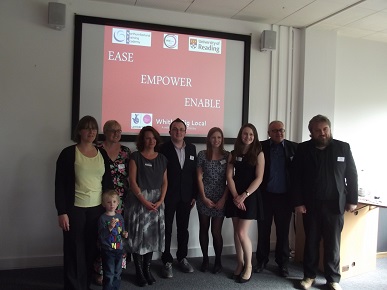More mobile community with better access to transport key to Whitley's future
Release Date 16 September 2015

Supporting the Whitley community in becoming ‘more mobile and connected' is key to tackling the deprivation and social exclusion associated with the area, a new University of Reading report has found.
The report highlights the biggest barriers to people ‘getting around' and suggests ways in which access to transport can be improved for all residents. These can then be targeted by project co-funder's Whitley Big Local - an initiative supported by a £1m Big Lottery grant which enables local people to make big lasting changes to the neighbourhood over 10 years.
After training by University of Reading experts in participatory action research methods, over 12 students and Whitley residents surveyed 500 local people on their experience of travelling around town. They also conducted 30 interviews with public and voluntary sector organisations, and arranged five community focus groups to get a thorough understanding of the issues involved.
The report's key findings and recommendations are:
Key findings
- 72% of people experienced a problem with local transport.
- 55% of carless residents were unable to find the transport they need.
- The greatest transport barriers are cost (31%) and the lack of direct bus routes (26%).
- Only 29% of people with mobility impairments can find the transport they need.
- The complex daily journeys of modern families, and caring roles of many women, place significant time pressures and financial stress on carless households.
- Connecting people, particularly children and families, to new places and experiences enhances lives and reduces insularity.
Recommendations
- Working with Reading Buses, local agencies and organisations to ease the affordability of public transport.
- Ease cross-Whitley travel to the Royal Berkshire Hospital (RBH) and other services by considering the re-introduction of a ‘cross-Whitley bus route' via Cressingham Road.
- Increase households' knowledge and confidence in the use of existing transport by introducing a virtual community transport scheme.
- Building partnerships with existing community groups to develop shared minibus and bike schemes.
- Provide an information hub in the community café with internet access and free smart cards.
- Empower families and residents with restricted mobility to access more ReadiBus services, particularly to the RBH and for days out.
Dr Sally Lloyd-Evans, from the University of Reading's Department of Geography and Environmental Science, said: "The everyday travel needs of Whitley residents are similar to those of any community. However, the area is home to a relatively high number of low-income families with young children, lone-parent households and those with family members with limited mobility or long-term ill health. These factors dictate how mobile residents are. However transport is not just about getting from one place to another - it is essential for building connections, widening access to education and reducing insularity and isolation.
"For instance being carless can make you more vulnerable to socio-economic pressures. Families with up to three children, women and households with a disabled family member are more likely to be affected. Having excellent transport links on your doorstep can make a big difference, from going shopping or travelling to a hospital appointment. But solving transport and mobility barriers in South Reading requires more than practical solutions. A holistic community programme that focuses on enhancing travel information, confidence and experience, is also key."
John Ord, Whitley Big Local Representative, added: "This is a very significant piece of collaborative research combining university and community talents. It peels away the usual assumptions about transport systems to reveal just how lack of mobility is experienced in working class neighbourhoods.
"It has also boosted the creation of community based research and we hope the residents' led Whitley Researchers will now go on to investigate other local issues, again in partnership with the University of Reading."
Working better with Whitley was funded by the University of Reading and the Whitley Big Local, with partners Whitley Community Development Association and the Northumberland Training Academy.
